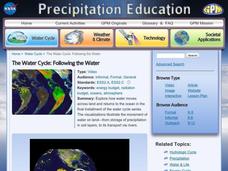Wonderscape
The Ozone Layer: Earth's Natural Sunscreen Under Threat
Explore how chemicals like chlorofluorocarbons (CFCs) impact the ozone layer, which acts as the Earth's natural sunscreen by absorbing harmful ultraviolet rays. Understand the environmental consequences of ozone depletion, including...
SciShow
3 Secrets About Ancient Earth, Hidden in Marine Fossils
Fossils can provide clues to the conditions that ancient species lived in, like what their environments felt like, how deep in the water some species lived, or even how long the Sun was out!
SciShow
3 Secrets About Ancient Earth, Hidden in Marine Fossils
Fossils can provide clues to the conditions that ancient species lived in, like what their environments felt like, how deep in the water some species lived, or even how long the Sun was out!
NASA
NASA | Why is the Ozone Hole Getting Smaller?
The Antarctic ozone hole reached its annual peak size on Sept. 11, according to scientists from NASA and the National Oceanic and Atmospheric Administration (NOAA). The size of this year’s hole was 24.1 million square kilometers (9.3...
Curated Video
The Fascinating World of Seals and Sea Lions
This video provides an overview of seals and sea lions, highlighting their diverse species, habitats, behaviors, and reproductive strategies. It explores their role as top predators in the ocean and emphasizes the importance of these...
MinuteEarth
These tiny shells know how much ice there is on Earth
Foraminifera – tiny, single-celled marine life forms – build gorgeous houses that record how much ice there is on the planet. SUPPORT MINUTEEARTH ************************** If you like what we do, you can help us!: - Become our patron:...
NASA
NASA | Active Region on the Sun Emits Another Flare
The sun emitted a significant solar flare on Oct. 22, 2012, peaking at 11:17 p.m. EDT. The flare came from an active region on the left side of the sun that has been numbered AR 1598, which has already been the source of a number of...
NASA
TESS Mission's First Earth-size World in Star's Habitable-zone
NASA's Transiting Exoplanet Survey Satellite (TESS) has discovered its first Earth-size planet in its star's habitable zone, the range of distances where conditions may be just right to allow the presence of liquid water on the surface....
Curated Video
5 Little Babies Jumping On The Bed Nursery Rhyme with Bella & Beans
5 Little Babies Jumping On The Bed Nursery Rhyme with Bella & Beans. If you are a fan of the 5 little monkeys Jumping on the bed then you will love 5 little babies jumping on the bed a fun nursery rhyme for all the family to sing along...
Bozeman Science
Plate Tectonics
An engaging video explores plate tectonics, from the evidence to support the theory to their movement. The analysis of the location of worldwide earthquakes shows scholars where major tectonic plates meet. The instructor...
NASA
The Water Cycle: Following the Water
Water that leaves the oceans must eventually return. The animations in the final lesson of the four-part NASA series show the complex path water can take across landforms before returning to the ocean. Approximately one-third of the...
Crash Course
Chordates
Did you know that coelacanths, a living chordate fossil, can live at an ocean depth of 2,300 feet, grow to be 6.5 feet long, and weigh almost 200 pounds? The narrator of a video series on evolution continues his way up the evolutionary...
TED-Ed
The Pangaea Pop-up
The amazing animation for a video on continental drift is comprised of the pages of a sophisticated pop-up book, The Moving Earth. As the pages turn, your earth scientists discover the tectonic plates of the lithosphere and the...
CPALMS
Florida State University Cpalms: Florida Students: Technology and Oceanography
An explanation of how technology is used to map ocean currents that otherwise would be difficult to study. Content is aligned to standards. [3:47]






